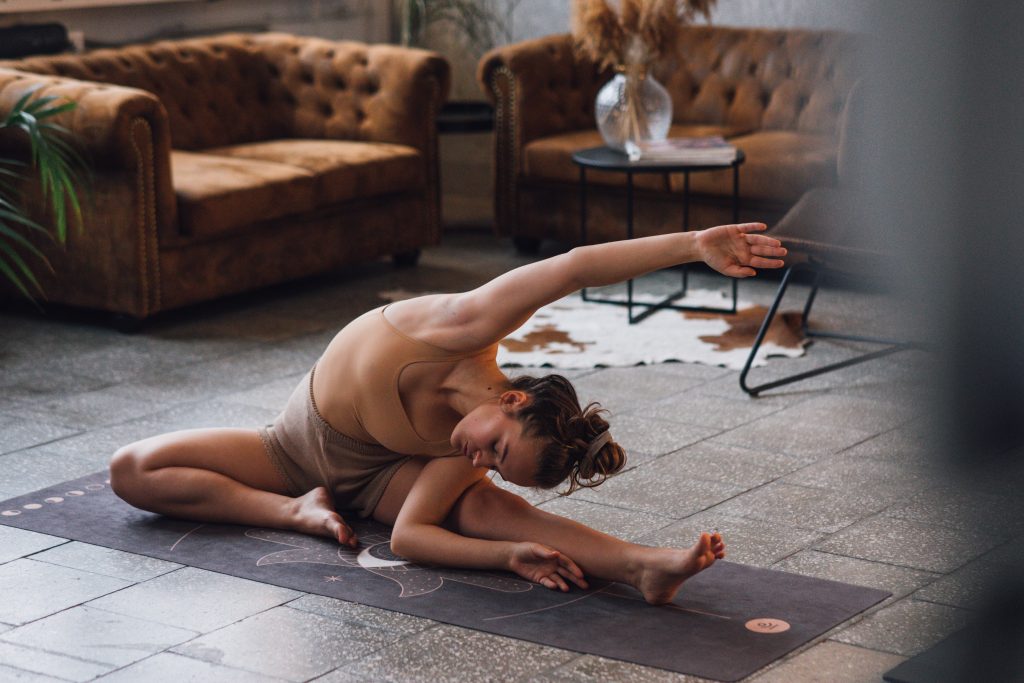Discover the benefits of Pilates exercises specifically designed for postpartum recovery.
Are There Pilates Exercises Tailored for Postpartum Recovery?
Congratulations on welcoming your little bundle of joy into the world! Now that you’ve entered the postpartum phase, it’s important to prioritize your recovery and well-being. One fantastic way to do this is through Pilates exercises, specifically designed to aid in your postpartum recovery journey.
Understanding Postpartum Recovery

Before jumping into the world of postpartum Pilates, it’s crucial to understand the changes your body undergoes after childbirth. Physically, your abdominal muscles and pelvic floor may experience weakness or even separation as the body adjusts. On an emotional level, the hormone roller coaster can trigger feelings of anxiety and exhaustion. The good news? Pilates can help tackle these issues head-on.
The Physical Changes After Childbirth
One of the primary physical changes post-childbirth is a weakened core. The abdominal muscles, which have stretched and expanded during pregnancy, may struggle to regain their strength. Additionally, the pelvic floor muscles, which support the bladder, uterus, and rectum, may become weakened or even damaged during childbirth. This can lead to issues such as urinary incontinence or pelvic organ prolapse.
Fortunately, Pilates offers an array of exercises that can re-strengthen these muscles. By focusing on your core, you can regain the stability required for daily activities while reducing the risk of lower back pain. Pilates exercises target the deep abdominal muscles, including the transverse abdominis, which acts as a corset, supporting the spine and pelvis. Strengthening these muscles can improve posture, alleviate back pain, and restore the overall strength and stability of your core.
In addition to core strength, Pilates also emphasizes proper alignment and posture. During pregnancy, the body undergoes significant changes in posture to accommodate the growing baby. This can lead to imbalances and misalignments in the spine and pelvis. Pilates exercises focus on alignment, helping to correct any postural imbalances and improve overall body mechanics.
Plus, who doesn’t want to rock those high-waisted jeans once again? With a strong core and improved posture, you’ll not only feel better physically but also regain confidence in your appearance.
Emotional and Mental Health Postpartum
Let’s not forget about the emotional and mental aspects of postpartum recovery. The postpartum period is often accompanied by a range of emotions, including joy, love, and excitement, but it can also bring about feelings of sadness, anxiety, and overwhelm. The hormonal changes that occur after childbirth can contribute to these emotional fluctuations.
Pilates serves as an oasis of calm amidst the chaos, promoting overall mental well-being. Through controlled movements and focused breathing, you can relieve stress, increase body awareness, and reconnect with yourself. The mind-body connection fostered by Pilates can help you navigate the emotional ups and downs of the postpartum period.
Additionally, participating in a Pilates class or joining a postpartum Pilates community can provide a sense of camaraderie and support. Connecting with other new mothers who are going through similar experiences can be incredibly comforting and empowering.
Furthermore, Pilates can help combat postpartum fatigue. The physical exertion and mindful movement involved in Pilates can boost energy levels and improve overall vitality. By taking time for yourself and engaging in Pilates, you are prioritizing self-care and investing in your own well-being.
So, whether you’re looking to regain physical strength, improve posture, enhance mental well-being, or find a supportive community, postpartum Pilates can be a valuable tool in your recovery journey. Embrace the opportunity to nurture your body and mind as you navigate the beautiful and transformative postpartum period.
The Role of Pilates in Postpartum Recovery
Now that you’re familiar with postpartum recovery, let’s delve into the incredible role that Pilates plays in this process.
After giving birth, your body goes through numerous changes as it adjusts and heals. It’s a time of physical and emotional transformation, and Pilates can be a powerful tool to aid in your recovery.
The Principles of Pilates
Pilates is all about precision, control, and centering. Through mindful movements, you’ll learn to engage and activate specific muscle groups. By centering your focus on core strength, Pilates works wonders for postpartum recovery. It’s time to rediscover your powerhouse!
When you practice Pilates, you’ll learn to move with intention and control. This mindful approach not only helps you reconnect with your body but also promotes a sense of calm and relaxation. As a new mother, finding moments of peace and tranquility can be invaluable.
Additionally, Pilates emphasizes the importance of proper alignment and posture. During pregnancy, your body undergoes significant changes to accommodate your growing baby. This can lead to imbalances and postural issues. Pilates can help realign your body, improving your posture and reducing discomfort.
Benefits of Pilates for New Mothers
The benefits of Pilates for new mothers are nothing short of incredible. Not only does it help rebuild your strength, but it also improves flexibility, posture, and overall body awareness. Say goodbye to the pregnancy slouch and hello to a confident, energized you!
One of the key benefits of Pilates is its ability to target the deep core muscles. These muscles, including the transverse abdominis and pelvic floor, play a crucial role in postpartum recovery. Strengthening these muscles can help restore stability to your pelvis and lower back, reducing the risk of pain and injury.
Furthermore, Pilates exercises are low-impact, making them gentle on your healing body. As a new mother, you may be eager to resume physical activity but cautious about overexertion. Pilates provides a safe and effective way to gradually rebuild your strength without putting excessive strain on your joints.
Another advantage of Pilates is its focus on breath control. Deep, diaphragmatic breathing is a fundamental aspect of Pilates practice. By learning to breathe deeply and fully, you can enhance your body’s oxygenation and circulation, promoting healing and recovery.
Moreover, Pilates can be a wonderful opportunity for self-care and self-nurturing. As a new mother, it’s essential to prioritize your well-being. Taking time for yourself and engaging in activities that make you feel good can have a positive impact on your overall mental and emotional health.
In conclusion, Pilates offers a multitude of benefits for postpartum recovery. From rebuilding strength and improving posture to promoting relaxation and self-care, it can be a transformative practice for new mothers. So, grab your mat and get ready to embark on a journey of healing and empowerment!
Tailored Pilates Exercises for Postpartum Recovery
Alright, mama, it’s time to get moving and grooving with some tailor-made Pilates exercises.
After giving birth, your body goes through numerous changes, both physically and emotionally. It’s important to take care of yourself and prioritize your postpartum recovery. One effective way to do this is through Pilates exercises specifically designed for postpartum women.
Pilates Moves for Core Strengthening
When it comes to postpartum recovery, core strengthening exercises are key. Imagine reconnecting with your abdominal muscles and feeling your core become a powerhouse once again. Pilates offers a variety of gentle yet effective moves like the Pilates Hundred and the Scissor to help you regain that coveted core strength.
The Pilates Hundred is a classic exercise that targets your deep core muscles. By lying on your back, lifting your head and shoulders off the mat, and pumping your arms up and down, you engage your abdominal muscles and increase blood flow to the area. This exercise not only strengthens your core but also improves your overall stability and posture.
The Scissor exercise is another fantastic Pilates move for postpartum women. By lying on your back, lifting your legs off the mat, and crisscrossing them in a scissor-like motion, you engage your core, hip flexors, and inner thighs. This exercise helps to tone and strengthen your abdominal muscles while also improving your flexibility.
Pilates Exercises for Back and Pelvic Floor
Your back and pelvic floor deserve some love too! Pilates has got your back (literally) with exercises like the Cat-Camel stretch and the Bridge. These movements target your back muscles, relieving tension and promoting proper alignment.
The Cat-Camel stretch is a gentle yet effective exercise that helps to release tension in your back. By getting on all fours and alternating between arching your back like a cat and then extending it like a camel, you stretch and strengthen the muscles along your spine. This exercise not only provides relief from any postpartum back pain but also improves your overall spinal mobility.
The Bridge exercise is another fantastic Pilates move for postpartum women. By lying on your back, bending your knees, and lifting your hips off the mat, you engage your glutes, hamstrings, and lower back muscles. This exercise helps to strengthen your back and improve your overall posture, making it easier for you to carry and care for your little one.
And let’s not forget about the pelvic floor, a vital part of your postpartum recovery journey. With exercises like Kegels and pelvic tilts, you’ll be well on your way to a toned and strong pelvic floor.
Kegels are simple yet powerful exercises that target your pelvic floor muscles. By squeezing and lifting the muscles that you use to stop the flow of urine, you strengthen your pelvic floor and improve bladder control. These exercises are particularly important after childbirth, as pregnancy and delivery can weaken the pelvic floor muscles.
Pelvic tilts are another great Pilates exercise for postpartum women. By lying on your back with your knees bent, you tilt your pelvis forward and backward, engaging your core and pelvic floor muscles. This exercise helps to improve the stability and strength of your pelvic area, reducing any postpartum discomfort and promoting optimal recovery.
Safety Measures for Postpartum Pilates
Safety should always be a top priority, especially when engaging in postpartum Pilates exercises.

When to Start Postpartum Pilates
Before jumping in, consult with your healthcare provider to ensure you’re ready for postpartum Pilates. Generally, it’s recommended to wait until at least six to eight weeks after vaginal delivery and ten to twelve weeks after a C-section. Every body is unique, so listen to your doctor and your own intuition!
Precautions to Take During Pilates Exercises
As you embark on your postpartum Pilates journey, keep these precautions in mind. Take things slow and modify exercises as needed. Honor your body’s limits, and don’t be afraid to rest when necessary. Remember, Rome wasn’t built in a day, and neither is your postpartum recovery!
Incorporating Pilates into Your Postpartum Routine
Making Pilates a regular part of your postpartum routine is crucial for long-term success. Here are some tips to help you maintain consistency and motivation:
Creating a Balanced Workout Schedule
Find a workout schedule that works for you and your new family dynamic. Whether it’s morning or evening, carve out dedicated time for your Pilates practice. Remember, you deserve this time to focus on yourself and recharge.
Maintaining Consistency and Motivation
Accountability is key when it comes to staying motivated. Consider joining a postpartum Pilates class or finding a workout buddy who can keep you on track. And don’t forget to celebrate your progress along the way. Treat yourself to that cute workout gear you’ve been eyeing – you’ve earned it!
So, mama, if you’re ready to embark on an exciting postpartum recovery journey, give Pilates a try. With its tailored exercises and focus on rebuilding strength and well-being, Pilates will have you back on the path to feeling like your incredible, vibrant self in no time. Stay committed, stay playful, and let the postpartum Pilates adventure begin!



